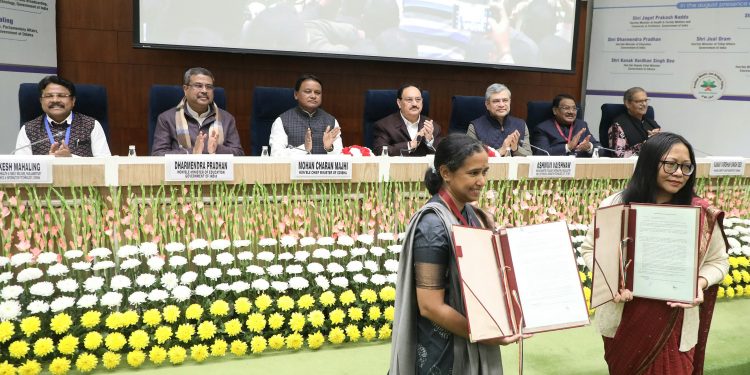Bhubaneswar: Odisha Monday became the 34th state to join the Ayushman Bharat Pradhan Mantri Jan Arogya Yojana scheme, seven months after the BJP came to power in the state.
As Odisha joined the health insurance programme, Prime Minister Narendra Modi congratulated the people of the state and took a swipe at the previous BJD dispensation for not adopting the scheme.
“It was indeed a travesty that my sisters and brothers of Odisha were denied the benefits of Ayushman Bharat by the previous Government. This scheme will ensure the highest-quality healthcare at affordable rates,” Modi posted on X.
https://twitter.com/narendramodi/status/1878787998856147099
He said the scheme will particularly benefit women and senior citizens.
The Odisha government’s health and family welfare department signed a Memorandum of Understanding (MoU) with the National Health Authority (NHA) in New Delhi to become the 34th state to implement the health assurance scheme.
The pact was signed in the presence of Union Health and Family Welfare Minister Jagat Prakash Nadda, Odisha Chief Minister Mohan Charan Majhi and other dignitaries.
Though the BJP-led Centre had urged Odisha’s previous government to join Ayushman Bharat, the BJD administration rejected the proposal, claiming that its own medical insurance scheme, Biju Swasthya Kalyan Yojana (BSKY), was better.
The saffron party came to power in Odisha in June 2024, defeating the Biju Janata Dal (BJD) which ruled the state for 24 years in a row.
The Majhi government has replaced the BSKY with Gopabandhu Jan Arogya Yojana (GJAY).
Addressing the gathering, Nadda accused the erstwhile BJD government of depriving the poor of the benefits of the national health scheme.
“The darkness has gone and Odisha joined the Ayushman Bharat scheme after a BJP government was formed in the state. The previous BJD government had rejected the Centre’s offer only on political consideration and ego,” he alleged.
Nadda said people need to understand that there is a grey area between darkness and light.
“This grey area is always very very problematic. We should be crystal clear, between day and night, between light and darkness and between development and status co…. This is a historic day. I cannot speak more on that, this is an indication,” he said.
The Centre had told the BJD government multiple times that many people from the state work in other parts of the country and do not get health insurance facilities, he said.
“We believe in cooperative federalism, but the ‘ego’ of the then government came on the way. Today, we have reached the point where Odisha could be included. Days are not far when Delhi will also be included under the Ayushman Bharat,” Nadda said.
The assembly elections in AAP-ruled Delhi will be held next month. The Ayushman Bharat scheme was also not implemented in Trinamool Congress-ruled West Bengal.
Addressing the gathering, Majhi said, “This significant development will change the health status of about 86 per cent of Odisha’s population. It is going to revolutionize the approach from top to bottom.”
Majhi claimed that though the Centre introduced the Ayushman Bharat scheme in 2018, the then Odisha government did not implement it for political reasons.
The chief minister also announced that the state will set up Ayushman Arogya Mandir, a health centre, in each gram panchayat in the state where a team comprising an Auxiliary Nurse and Midwife (ANM), a yoga teacher and a health worker will work.
The facility will later be extended to urban areas and budgetary provision for this will be made, he said.
Majhi said the state will implement the Ayushman Bharat scheme in convergence with GJAY. The convergence scheme, for which one bilingual health card will be issued to the beneficiary, will provide cover of Rs 5 lakh per family per annum with an additional Rs 5 lakh for women members.
Approximately 1.03 crore families in Odisha will benefit from the converged scheme. With Aysuhman Bharat scheme coming into effect, over 23.13 lakh people aged 70 years or more would also be covered under medical insurance irrespective of their financial status, an official statement said.
The beneficiaries will be able to avail cashless treatment at over 30,000 hospitals across the country in place of only 900 hospitals under the previous BSKY, it said.
The Odisha government has already linked the e-KYC data of one crore residents with the central database for the purpose.






































